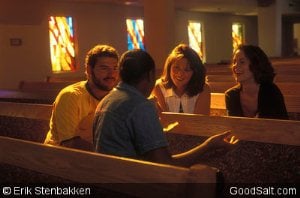Wednesday: Telling Our Stories
 As stated earlier, the most powerful witnessing a believer can do for Jesus is to share his or her personal testimony. That is, the sharing of what God has done for me and how He has affected my life and experience. Usually a personal testimony is expressed in three distinct sections. The first part is a short review of the believer’s life before accepting Jesus as personal Savior. The second part is an explanation of how the person met the Lord. The third is a declaration of the life experience after getting to know Jesus.1
As stated earlier, the most powerful witnessing a believer can do for Jesus is to share his or her personal testimony. That is, the sharing of what God has done for me and how He has affected my life and experience. Usually a personal testimony is expressed in three distinct sections. The first part is a short review of the believer’s life before accepting Jesus as personal Savior. The second part is an explanation of how the person met the Lord. The third is a declaration of the life experience after getting to know Jesus.1
Read through Acts 22:2–21. Paul’s defense speech before the Jerusalem council is in the form of a personal testimony. What were some of the points he made in each section of his testimony?
His life before he knew the Lord Jesus (vss. 3–5):
How he met the Lord (vss. 6–16):
His life experience after his conversion (vss. 17–21):
Even if you were raised in a Christian home and did not experience a dramatic conversion experience, you certainly had a special time when you made your personal commitment to Jesus Christ. Think back on your experience and write out some points that will help to form your own personal testimony.
My life before I knew the Lord Jesus (or before I made a commitment to Him):
How I met Jesus (or what influenced my commitment to Him):
My life after I accepted Jesus as my personal Savior:
A personal testimony should not be a long and detailed autobiography. We mentioned earlier that witnessing is a more spontaneous way of sharing Jesus than is a planned evangelistic approach. Christians should be able to give their testimony in a short space of time, because we don’t know when the opportunity may arise to speak of Jesus. It could be in any number of unplanned places and times. It may be on a plane or at a bus stop. It may be during a short telephone call. However the situation arises, we should be ready and willing to speak about what the Lord has done for us, what reasons we have for our faith, and the hope that God offers not just to us but to others.
Consider the eternal difference between the lost and the saved, between eternal death and eternal life. In the long run, what else really matters?

God wants us to witness, to tell others about His unfailing and Great love to us. He wants us to reach other people who don’t know how Loving God is. We must remember that we cannot avoid witnessing with our lifestyle. If people know we are Christians, they are watching us. Telling our own experience about God’s Love for us is witnessing. Witnessing does not mean talking about a theological theory or about something we know from hearsay; it means talking about something we have experienced. But “talking” need not always be words–it can also be actions, living and personal involvement in all sorts of different projects.
We must pray always that every moment of our lives God may intervene on us as we go to our daily activities. That the people surrounding us may see that Jesus is with us. Our lives must be a living testimony to them.
Wherever may we be, whatever situation we have now, God is calling us to witness. How? God will let us know.
I prayed that as I go on to live in this sinful world, that the people surrounding me can say, “I can see JESUS on that man”. God Bless us ALL us we continue to witness about our living GOD.
You can only be a witness if you have seen or experienced something with Christ. You can’t be in contact with Christ and remain the same, you will always witness a change to share.
We experience Christ throught His words and am proud to be an SDA.